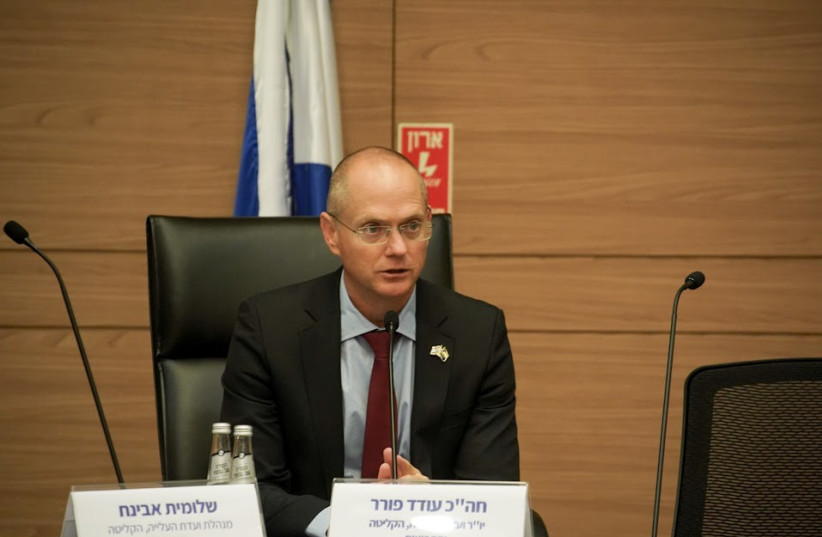Alina Palhati, 21, a Russian-Israeli woman who was murdered by Hamas at the Supernova music festival on October 7, was buried "outside the fence" of the cemetery in Beit She’an, because at the time of her death, she had not yet completed the process of converting to Judaism, and as such was not considered eligible for burial.
The incident came to light on Monday during a Knesset discussion about expediting the conversion process for those currently serving in the IDF. “Alina was murdered as a Jew,” Palhati’s mother Olga said at the hearing, her voice choking up. “In the obituary notice, they didn't write that we were sitting the shiva mourning period, they said that we were receiving guests."
Oded Forer, who chairs the Knesset’s Aliyah, Absorption, and Diaspora Affairs Committee, responded that he was “ashamed on behalf of the State of Israel that you were treated this way.” He called Palhati’s treatment “the greatest insult to someone who sanctified the land of Israel with their blood, who left their place in exile to come here. I want to be buried next to such a person,” he declared, “even if it means being buried outside the fence.”
The committee also discussed the case of the Kapshiter family of four, who were all killed by Hamas terrorists on October 7 while on their way home from Ashkelon to Beersheba. Yania (Yevgeni) Kapshiter, killed alongside his wife, Dina, and two children, Aline, 8, and Eitan, 5, was denied a Jewish burial in the Dimona cemetery, and so he, like Palhati, was buried "outside the fence."
The surviving family members, the children’s grandparents, decided to bury the entire family together "outside the fence," even though the others were entitled to be buried inside the cemetery itself.
The politicians and religious authorities at the hearing reacted to the stories with shock. Yesh Atid MK Elazar Stern said he “apologize[d] on behalf of all Judaism,” saying “This is not the Judaism we are a part of. Not our children’s, not our grandchildren’s [and] not my Judaism.”
Rabbi Haim Amsalem, a former Shas MK, said the treatment of these families bordered on criminal. “There is no description,” he said, “that can capture this very wrong thing.”

MK to Rabbinate: 'If you don't change the rules, we'll get rid of them for you.'
Rabbi Eliezer Simcha Weiss, who sits on the rabbinate’s committee for honoring the dead, said he would propose a special representative to find solutions to problems like these, “so that there will not be a great trouble like this.” He added that “they did not distinguish between Jews and non-Jews in the brutal attack. We can do everything in line with Jewish law.”
Forer said that “such damage to even one family is severe,” and asked “that this be the instruction that comes down from the chief rabbi to every rabbi: expect difficult cases. Jewish law knows how to solve problems.” Rabbi Edo Pachter, who accompanied Olga Palhati to the committee, said that in his opinion the rabbinate should apologize to Palhati.
Rabbi Chaim Weisberg, chief rabbi of the IDF, said the situations discussed in the hearing did not occur within the IDF. “We fight together and are buried together,” he said. “There is no burial ‘outside the fence.’
Yisrael Beytenu MK Yulia Malinovsky said that there are now 7,000 soldiers in the IDF who are not Jewish according to Halacha. “The mere fact that a person has enlisted in the IDF,” Malinovsky said, “is Judaism in my eyes. He is ready to die for the sake of the country.” Malinovsky told IDF representatives not to wait for soldiers to ask for a conversion, but rather to present a solution to the problem themselves. “You can arrange wedding canopies in army camps,” she said, “this is all a question of will.”
"If on the subject of conversion and burial, you won't change the limits," she said, "the people will blow up the limits for you. Today, we're asking you. In the future, we will demand it."
Malinovsky connected the issue to a broader notion of what must be rethought in the aftermath of the massacre. “What happened on October 7 was not only the collapse of the security ‘conception,’” she said, referring to a blindspot among the authorities, “but also the halachic one. If we do not address this, after everything is over, we will fall apart from the inside. If you want to be part of the nation and the country,” she said, “you must not remain in the old ‘conceptions.’”
Porer summarized the discussion similarly. “There is ‘before Simchat Torah,’” he said, referring to the October 7 attack, “and there is ‘after,’ as far as the people of Israel are concerned. Let it be clear,” he said, “that those who have chosen to bind their fate with the Jewish people, those who are here in the country to fight for our right to live here, my demand is to go towards him.”
